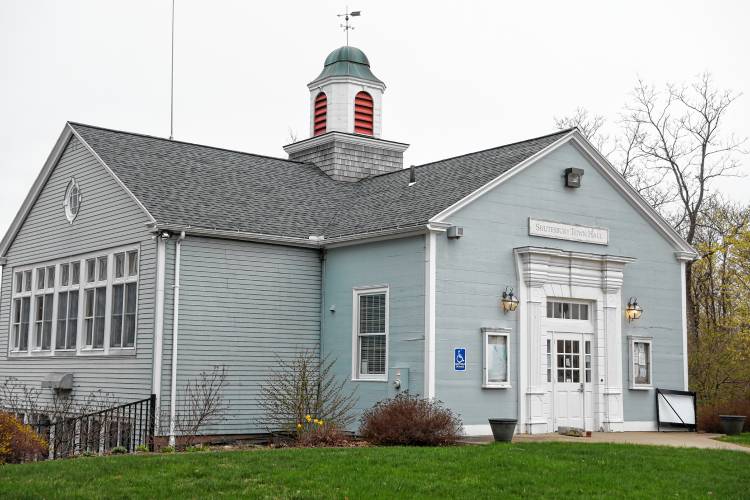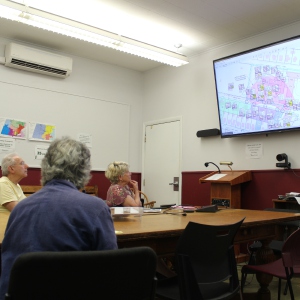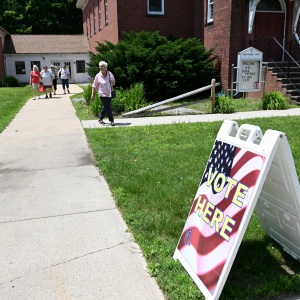Clean energy measures, $7.68M budget coming to Shutesbury Town Meeting on Saturday

Shutesbury Town Hall FILE PHOTO
| Published: 05-27-2025 10:12 AM |
SHUTESBURY — Prioritizing purchase of zero-emission vehicles, supporting municipal decarbonization by 2050 and opting into the state’s specialized energy code, while enhancing the existing safe community bylaw and adopting a town spending plan for the fiscal year beginning July 1, are among articles voters will decide at annual Town Meeting Saturday.
Voters will take up the 46-article warrant, which includes a $7.68 million municipal operating budget, starting at 9 a.m. at the Shutesbury Elementary School.
The budget is up 5.8%, or $425,451, from this year’s $7.25 million, and includes a $1.78 million assessment for the Amherst Pelham Regional Schools. That assessment is increasing 7.8%, or $126,789, from this year’s $1.65 million assessment, with Shutesbury obligated to pay this amount because Amherst, Pelham and Leverett have already adopted their assessments toward the $37.08 million regional schools budget.
Also included in the town spending is the budget for the elementary school, up by 5%, or $124,241, from $2.47 million to $2.59 million. Other changes include boosting the administrative assistant position to $44,265, up $14,701, for 32-hour workweeks, and increasing health insurance payments by 19%, or $99,000, from $520,000 to $619,000.
Other spending will mostly be covered by free cash, with $50,000 going toward establishing a mitigation fund for PFAS contamination, and another $100,000 coming from the stabilization account. Another $30,000 in free cash will cover legal expenses related to protecting the town’s solar bylaw.
The warrant includes several capital purchases and repairs through free cash, including fixing the Highway Department grader for $16,600, buying a zero-turn lawn mower for the Highway Department for $11,400, completing Town Hall meeting room repairs for $10,000 and replacing the Town Hall fire alarm system for $8,648.
Finally, $8,000 in free cash will serve as matching funds for an $80,000 Rural Development Fund Grant that will evaluate sources of erosion into Lake Wyola and potential mitigation and management measures.
Several projects are being supported by Community Preservation Act money. They include $72,900 to restore, repair and preserve the recreational trails in the South Brook Conservation Area; $13,775 to develop a scope of work for dam repair and maintenance of the Lake Wyola dam; $9,000 to preserve, rehabilitate and restore historic gravestones at West Cemetery; and $4,000 to remove invasive plants and replace them with native species at the Top of the Lake Conservation Area.
Article continues after...
Yesterday's Most Read Articles
 PHOTOS: Green River Festival wraps up 39th year
PHOTOS: Green River Festival wraps up 39th year
 After 36 years with department, Montague police chief to retire
After 36 years with department, Montague police chief to retire
 Tests show flow of contamination from former Lunt Silversmiths site in Greenfield
Tests show flow of contamination from former Lunt Silversmiths site in Greenfield
 Green River Festival brings ‘cultural melting pot’ of music to fairgrounds
Green River Festival brings ‘cultural melting pot’ of music to fairgrounds
 Orange residents reject Proposition 2½ override; 15% cuts to departments possible
Orange residents reject Proposition 2½ override; 15% cuts to departments possible
 Small group, big impact: Volunteers form community in Greenfield while removing invasive plants
Small group, big impact: Volunteers form community in Greenfield while removing invasive plants
Also, $6,482 in CPA spending will complete the work of fixing up the historic Town Common guideboard, with an additional $2,250 going toward building a concrete foundation base for the guideboard.
The Energy and Climate Action Committee is seeking endorsement of the “Zero-Emission First Vehicle” policy and to repeal a policy adopted in 2011 in which only fuel-efficient vehicles are purchased.
The purpose of this is to “advance the economic, energy and climate sustainability of municipal operations by achieving long-term reductions in energy costs, energy consumption, and greenhouse gas emissions,” with hopes to accelerate the adoption of emissions-reduction technologies and the transition of the fleet to all electric or other environmentally advantageous vehicles. The new policy does allow for the town’s purchases of such vehicles “as financially feasible and practicably appropriate.”
That committee is also recommending adoption of the state’s specialized energy, which will impact new construction and existing buildings by further reducing the climate impacts of buildings, with the goal of achieving net-zero greenhouse gas emissions from the buildings sector no later than 2050. This means the town will go beyond the existing stretch energy code.
Shutesbury voters will also be asked to commit to a “municipal decarbonization,” defined as the elimination of all on-site burning of fossil fuels in municipal buildings and vehicles, by 2050, in accordance with state climate goals.
A citizen petition is promoting the town as a safe and welcoming community, building on the “Honoring our Differences in a Safe Community” passed in 2017.
A petition also seeks support for Massachusetts Medicare for All, which would promote the idea of establishing a single-payer health care system in the state.
Revised rules for use of Lake Wyola are in the “Watercraft and Persons Using Lake Wyola” bylaw, last amended in 2014.
Sponsored by the Lake Wyola Safety and Boating Committee, this makes minimal changes to the current bylaw, which has rules setting the speed limit at 30 mph during the daytime, and 5 mph from dusk to dawn, requiring motorboats to go counterclockwise, limiting water skiing to daylight hours and requiring swimmers to be accompanied by a boat when they are 150 feet or more from shore.
The major change includes adding a statement to the bylaw that “reckless or unsafe boating is prohibited, including speeding near shorelines, swimmers, or docks, boating under the influence, and failing to maintain a proper lookout,” setting 8 a.m. as the specific dusk time and increasing the speed limit to 6 mph, which matches state regulations.
Matt Borowiec, who chairs the Lake Wyola Boating & Safety Review Committee, told the Select Board that there has been a strong push for more education, but not other major changes.
The Planning Board is updating the town’s zoning bylaws. One will remove the rate-of-growth provisions from the town’s zoning, because the effective dates have expired. A second will add language regulating so-called tiny houses, which are now included in the state building code. Finally, accessory dwelling units, which are now part of the state’s Affordable Homes Act and a protected use, will be included in the bylaws.
Town Clerk Grace Bannasch is bringing forward the amended “Dog Licensing And Control Bylaw” adopted in 2002. The impetus for this is the kennel license procedure and Ollie’s Law passed last year by the state Legislature, though this doesn’t impact any residents. The bylaw change will be to have the dog tag year be done on the calendar year rather than fiscal year, so licenses will be renewed in January, which Bannasch said will “make a lot more sense to the average dog owner than renewing them in July.”
Finally, another citizen petition seeks to create a bylaw requiring a landowner’s written permission before anyone is allowed to “trap, fish, hunt, or discharge a firearm, bow, or other weapon for the purposes of hunting animals, fish, birds, or any game on any private property in the town.”






 Pioneer’s Innovation Career Pathways environmental science program shows results
Pioneer’s Innovation Career Pathways environmental science program shows results Cub Scouts recycling efforts bears fruit with new bench in Bernardston
Cub Scouts recycling efforts bears fruit with new bench in Bernardston
